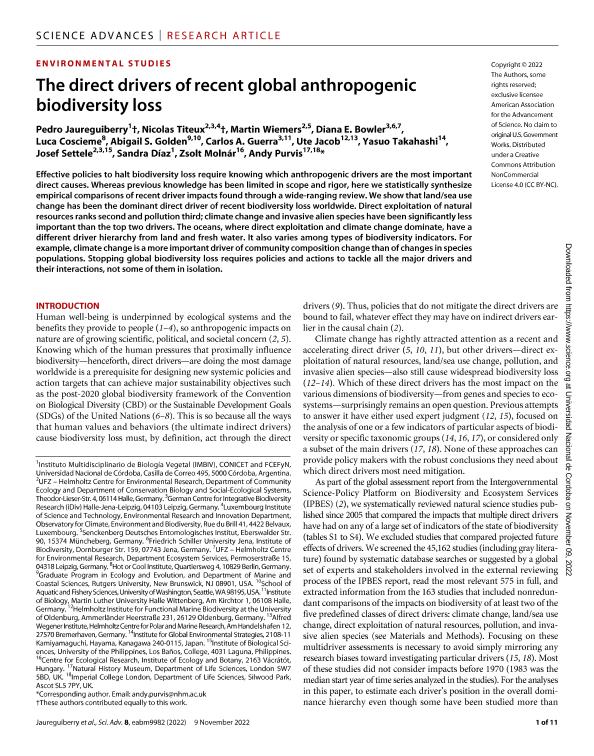Mostrar el registro sencillo del ítem
dc.contributor.author
Jaureguiberry, Pedro

dc.contributor.author
Titeux, Nicolas
dc.contributor.author
Wiemers, Martin
dc.contributor.author
Bowler, Diana E.
dc.contributor.author
Coscieme, Luca
dc.contributor.author
Golden, Abigail S.
dc.contributor.author
Guerra, Carlos A.
dc.contributor.author
Jacob, Ute
dc.contributor.author
Takahashi, Yasuo
dc.contributor.author
Settele, Josef
dc.contributor.author
Díaz, Sandra Myrna

dc.contributor.author
Molnár, Zsolt
dc.contributor.author
Purvis, Andy
dc.date.available
2023-06-14T14:50:34Z
dc.date.issued
2022-11
dc.identifier.citation
Jaureguiberry, Pedro; Titeux, Nicolas; Wiemers, Martin; Bowler, Diana E.; Coscieme, Luca; et al.; The direct drivers of recent global anthropogenic biodiversity loss; American Association for the Advancement of Science; Science Advances; 8; 45; 11-2022; 1-12
dc.identifier.issn
2375-2548
dc.identifier.uri
http://hdl.handle.net/11336/200562
dc.description.abstract
Effective policies to halt biodiversity loss require knowing which anthropogenic drivers are the most important direct causes. Whereas previous knowledge has been limited in scope and rigor, here we statistically synthesize empirical comparisons of recent driver impacts found through a wide-ranging review. We show that land/sea use change has been the dominant direct driver of recent biodiversity loss worldwide. Direct exploitation of natural resources ranks second and pollution third; climate change and invasive alien species have been significantly less important than the top two drivers. The oceans, where direct exploitation and climate change dominate, have a different driver hierarchy from land and fresh water. It also varies among types of biodiversity indicators. For example, climate change is a more important driver of community composition change than of changes in species populations. Stopping global biodiversity loss requires policies and actions to tackle all the major drivers and their interactions, not some of them in isolation.
dc.format
application/pdf
dc.language.iso
eng
dc.publisher
American Association for the Advancement of Science

dc.rights
info:eu-repo/semantics/openAccess
dc.rights.uri
https://creativecommons.org/licenses/by-nc-sa/2.5/ar/
dc.subject
ANTHROPOGENIC DIRECT DRIVERS
dc.subject
BIODIVERSITY LOSS
dc.subject
POST-2020 GLOBAL BIODIVERSITY FRAMEWORK
dc.subject
IPBES
dc.subject.classification
Ecología

dc.subject.classification
Ciencias Biológicas

dc.subject.classification
CIENCIAS NATURALES Y EXACTAS

dc.title
The direct drivers of recent global anthropogenic biodiversity loss
dc.type
info:eu-repo/semantics/article
dc.type
info:ar-repo/semantics/artículo
dc.type
info:eu-repo/semantics/publishedVersion
dc.date.updated
2023-06-12T13:48:59Z
dc.journal.volume
8
dc.journal.number
45
dc.journal.pagination
1-12
dc.journal.pais
Estados Unidos

dc.description.fil
Fil: Jaureguiberry, Pedro. Consejo Nacional de Investigaciones Científicas y Técnicas. Centro Científico Tecnológico Conicet - Córdoba. Instituto Multidisciplinario de Biología Vegetal. Universidad Nacional de Córdoba. Facultad de Ciencias Exactas Físicas y Naturales. Instituto Multidisciplinario de Biología Vegetal; Argentina
dc.description.fil
Fil: Titeux, Nicolas. German Centre For Integrative Biodiversity Research (idiv) Halle-Jena-Leipzig; Alemania. Luxembourg Institute Of Science And Technology; Luxemburgo. Helmholtz Zentrum Für Umweltforschung; Alemania
dc.description.fil
Fil: Wiemers, Martin. Helmholtz Zentrum Für Umweltforschung; Alemania. Senckenberg Gesellschaft Für Naturforschung; Alemania
dc.description.fil
Fil: Bowler, Diana E.. German Centre For Integrative Biodiversity Research (idiv) Halle-Jena-Leipzig; Alemania. Universitat Jena; Alemania. Helmholtz Zentrum Für Umweltforschung; Alemania
dc.description.fil
Fil: Coscieme, Luca. Hot Or Cool Institute; Alemania
dc.description.fil
Fil: Golden, Abigail S.. University of Washington; Estados Unidos. German Centre For Integrative Biodiversity Research (idiv) Halle-Jena-Leipzig; Alemania. Department Of Marine And Coastal Sciences; Estados Unidos
dc.description.fil
Fil: Guerra, Carlos A.. German Centre For Integrative Biodiversity Research (idiv) Halle-Jena-Leipzig; Alemania. Martin Luther University Halle Wittenberg; Alemania
dc.description.fil
Fil: Jacob, Ute. Universität Oldenburg; Alemania. Alfred-Wegener-Institut Helmholtz-Zentrum Für Polar- Und Meeresforschung; Alemania
dc.description.fil
Fil: Takahashi, Yasuo. Institute For Global Environmental Strategies; Japón
dc.description.fil
Fil: Settele, Josef. German Centre For Integrative Biodiversity Research (idiv) Halle-Jena-Leipzig; Alemania. University Of The Philippines, Los Baños; Filipinas. Helmholtz Zentrum Für Umweltforschung; Alemania
dc.description.fil
Fil: Díaz, Sandra Myrna. Consejo Nacional de Investigaciones Científicas y Técnicas. Centro Científico Tecnológico Conicet - Córdoba. Instituto Multidisciplinario de Biología Vegetal. Universidad Nacional de Córdoba. Facultad de Ciencias Exactas Físicas y Naturales. Instituto Multidisciplinario de Biología Vegetal; Argentina
dc.description.fil
Fil: Molnár, Zsolt. Institute Of Ecology And Botany; Hungría
dc.description.fil
Fil: Purvis, Andy. Imperial College London; Reino Unido. Natural History Museum; Reino Unido
dc.journal.title
Science Advances

dc.relation.alternativeid
info:eu-repo/semantics/altIdentifier/url/https://www.science.org/doi/10.1126/sciadv.abm9982
dc.relation.alternativeid
info:eu-repo/semantics/altIdentifier/doi/http://dx.doi.org/10.1126/sciadv.abm9982
Archivos asociados
